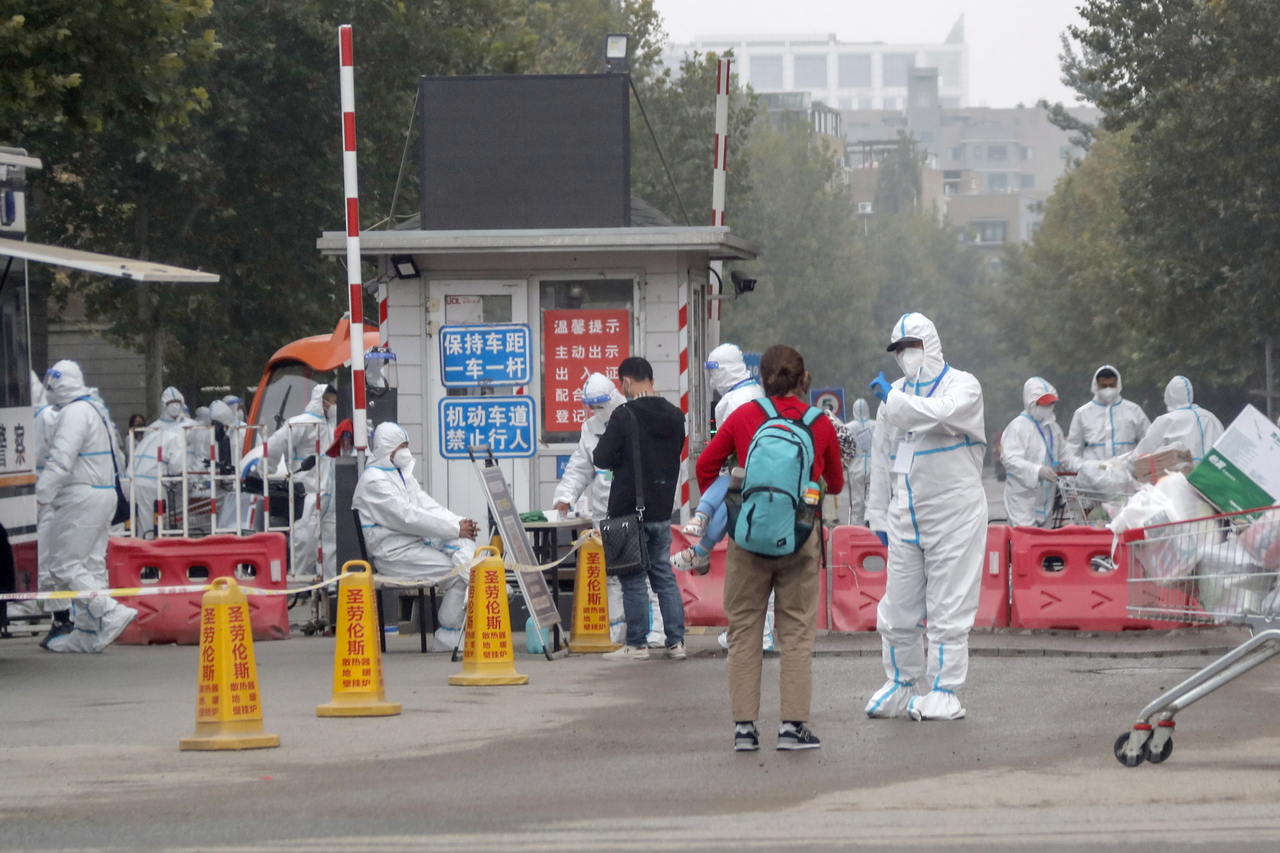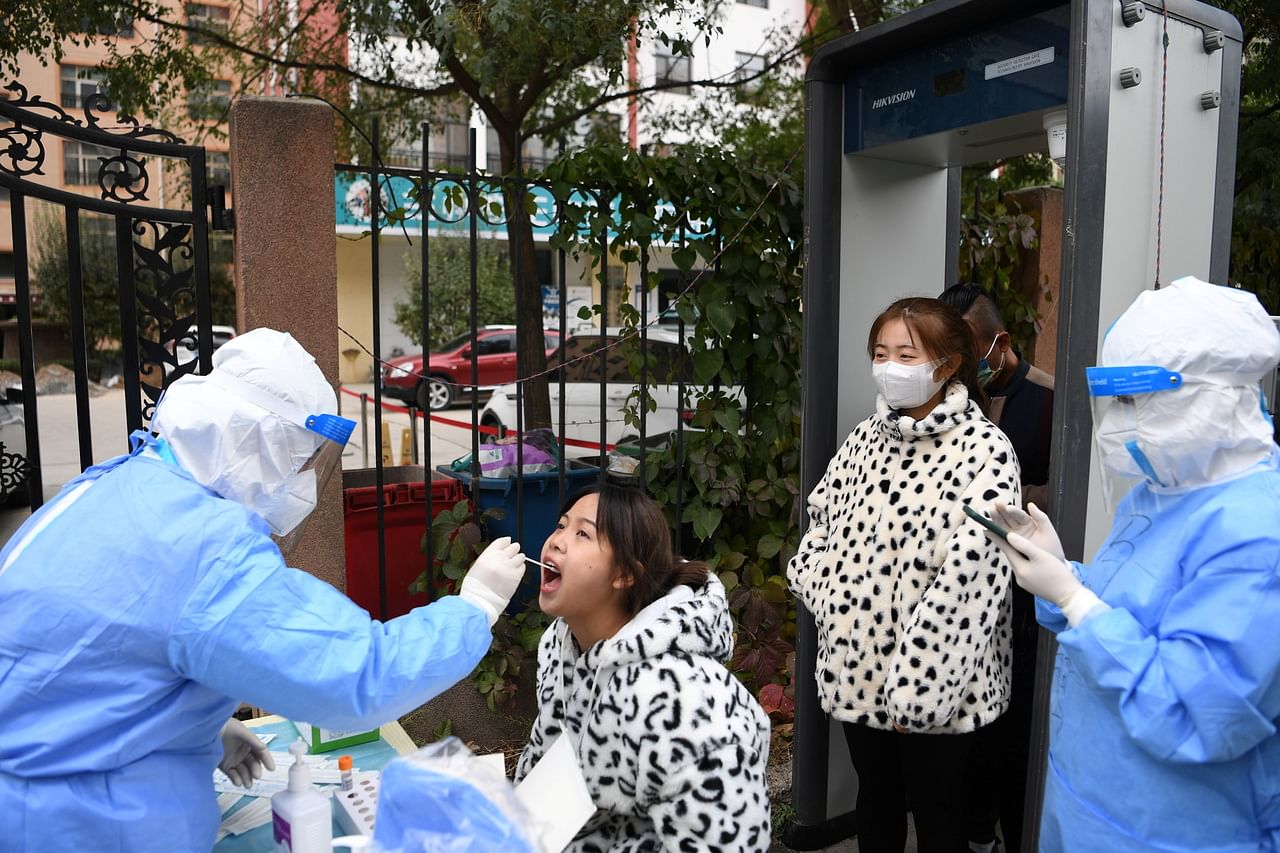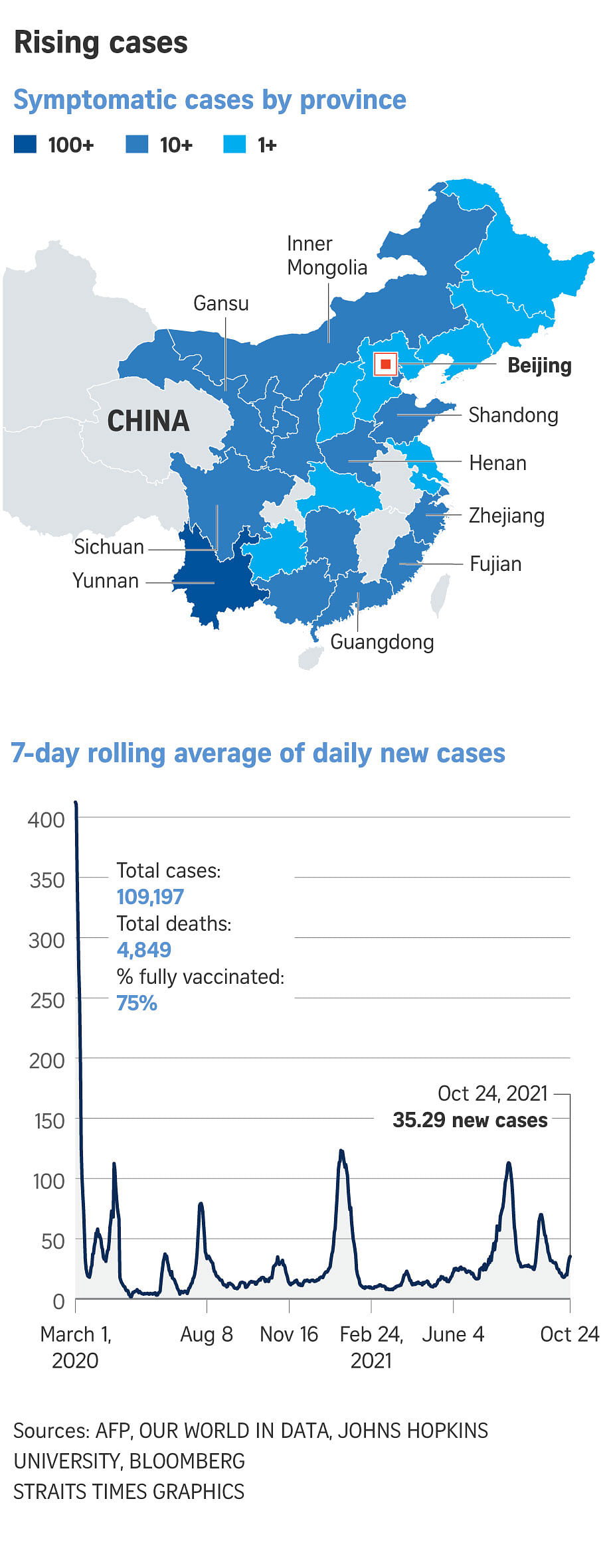China on high alert as Covid-19 outbreaks linked to domestic tourists spread
Sign up now: Get insights on Asia's fast-moving developments

Epidemic prevention and control staff stand guard at a neighbourhood under lockdown at the Hongfuyuan residential community in Changping district of Beijing on Oct 25, 2021.
PHOTO: EPA
Follow topic:
BEIJING - A rash of coronavirus outbreaks, including in capital city Beijing, has put China on high alert mere months before the Winter Olympics, with officials warning that cases are likely to rise in the coming days.
The latest spate of infections has now affected 11 provinces and is linked to the Delta variant, health officials have said. Most of the cases were linked to domestic tourists, given the country's closed borders.
According to a senior health official, over 100 infections in the current outbreak were linked to holidaymakers, including those who had gone on a self-driving holiday.
The outbreak is believed to have a foreign source, said deputy director of disease control at the National Health Commission (NHC) Wu Liangyou at a press briefing on Monday (Oct 25).
China reported 39 new coronavirus infections, 35 of which were local transmissions, on Monday. Mainland China currently has 561 active Covid-19 cases.
While the number appears low as compared to many countries around the world, the country has a zero tolerance approach to the virus, responding to each infection with stringent measures that include quarantine and even lockdowns of entire housing estates.
"It is expected that as the investigation and screening of at-risk groups continues, the number of cases detected in the next few days will continue to increase," said Mr Wu.
"The scale of the epidemic may grow further."
China's top official overseeing the Covid-19 response, Vice-Premier Sun Chunlan, said last week that the multiple outbreaks, coupled with the quickly approaching winter season, means the development of this wave could be "uncertain".
The latest wave, which comes on the heels of another outbreak in the southern Fujian province, is yet another test of China's zero tolerance policy. The authorities have responded with targeted lockdowns and mass testing while prompting residents to take their vaccine booster shots.
Some 2.246 billion doses of Covid-19 vaccines have been administered as at Sunday, according to the NHC.
Special teams have been sent to aid the pandemic response in Inner Mongolia, Gansu, Shaanxi and Ningxia, among China's less affluent areas.

<p>A medical worker in protective suit collects a swab from a resident at a free nucleic acid testing site following new cases of the coronavirus disease (COVID-19), in Lanzhou's Chengguan district, Gansu province, China October 20, 2021. cnsphoto via REUTERS ATTENTION EDITORS - THIS IMAGE WAS PROVIDED BY A THIRD PARTY. CHINA OUT.</p>
PHOTO: X80002
Some 35,000 people in Inner Mongolia were on Monday told to stay home as Ejin county in the region went into lockdown.
Some cities, including Gansu's provincial capital Lanzhou, and parts of Inner Mongolia have already suspended bus and taxi services and closed tourist sites.
Inter-provincial tour groups in five areas where cases have been detected were suspended on Sunday.
In Beijing, the authorities have shut several pharmacies after several patients - infected after a road trip to Inner Mongolia - tried to self-medicate in a bid to avoid the onerous measures that come with testing positive.
Police have launched three investigations into alleged breach of Covid-19 measures, including two infected people who initially concealed their symptoms, two residents escaping lockdown by climbing over a fence, and two pharmacy managers who sold cough and fever medicine in a breach of Covid-19 restrictions.
Anyone buying cold or flu medicine has to register, in case he later turns out to have the virus.
With the Communist Party of China's sixth plenum quickly approaching and the Winter Olympics coming shortly after on Feb 4-20, the authorities are keen to put a lid on the infections.
Party leaders from across the country are expected to descend on the capital from Nov 8-11 for the annual meeting.
Beijing city has gone into overdrive, ordering mass testing for all who have been to affected areas, even quarantining some. Foreign journalists have also been uninvited from government events for reasons of Covid-19 prevention.
The city is also restricting entry for those who have been to places with Covid-19 infections, Beijing's publicity vice-minister said on Monday, and residents have been advised to avoid large gatherings and "unnecessary travel" out of the capital.
Gaming parlours have been shut after some of those infected played cards together even after exhibiting Covid-19 symptoms, while venues like cinemas and tourist attractions are operating at 70 per cent capacity.
China still has some of the world's toughest quarantine measures, requiring travellers to undergo between 14 and 28 days of quarantine - along with multiple nucleic acid and serology tests - before being allowed into the country.
It has also recently upped its entry requirements for travellers from Singapore, calling for an additional nucleic acid test three days before flight.
The measures are to "further contain the spreading of Covid-19" and to "secure cross-border travel and people-to-people exchanges", said the Chinese Embassy in Singapore in a WeChat post.


